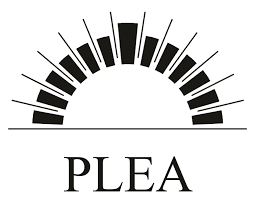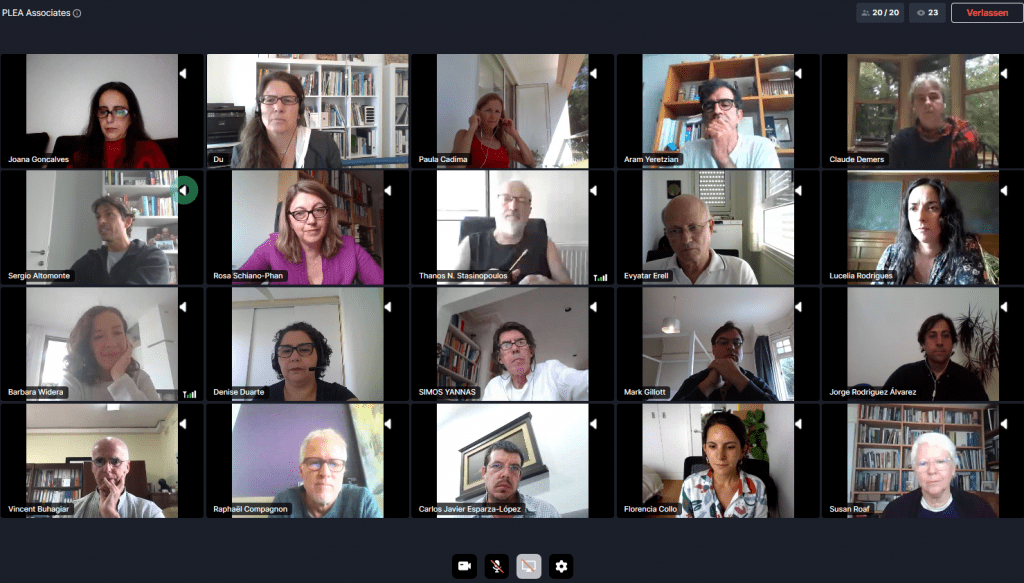The PLEA community is sad to know that Professor Baruch Givoni has passed away on the eve of his 110th birthday.
“Sorry to hear the news of Prof. Baruch Givoni! ‘Man, Climate and Architecture’ was one of the most important books of the architecture programme. One can feel the commitment, enthusiasm, and love of the field between the lines. I was fortunate to meet the ‘Man’ in person at the PLEA Millenium Conference at Cambridge and had quite an in-depth discussion, where we even talked about having him on board as a cosupervisor for one of my students in Bangladesh, which he enthusiastically agreed. We will miss Baruch but we will always find the ‘Man’ amongst us when we will think about Climate and Architecture.”
— Khandaker Shabbir Ahmed, PLEA Associate
“It is with great sadness that I have heard the news of the depart of Prof. Givoni, one of our masters, a reference, an example, a reading companion in many educational journeys. Although this is a gap impossible to fill, this leaves us with the great responsibility to continue carrying on his fundamental legacy. Thank you, Baruch! ”
— Sergio Altomonte, PLEA Associate
“I had the prestigious opportunity of having breakfast with him in Florence. We later co-chaired a session at the TIA Confernce in 1997. Our email exchanges were rich in academic dialogue, with a common view towards keeping buildings cool, in our common hot climate, such as Israel and Malta.” His seminal work through books such as Man, Climate and Architecture and Passive Low Energy Cooling of Buildings remain the springboard of today’s extensive passive design literature and allied fields.”
— Vincent Buhagiar, PLEA Associate
“He had indeed contributed so much to our field and to the PLEA spirits – he was a very approachable person always ready to listen to students and colleagues!”
— Paula Cadima, PLEA Board Member
“Prof. Givoni was a very passionate and dedicated teacher. His work has inspired generations of researchers and practitioners in the field. I had the opportunity to work closely with him for some time. That was a really valuable experience that I still treasure today.”
— Vicky Cheng, a student of Prof. Givoni
“Besides his lifetime inspiring works, amidst my best PLEA memories are our talks during the annual conferences, since the late 90’s. I remember his recurrent questions every time we met: ‘tell me what are you doing with your students’, ‘do you have a poster?’, ‘let me see the data’. I am endlessly indebted for his kind words and invaluable advice.”
— Denise Duarte, PLEA Associate
“A pioneer of an evidenced based approach to environmental design in architecture. His research and writing has formed a foundation for much of what we do. His life and work deserve to be celebrated. ”
— Brian Ford, PLEA Associate
“I meet Givoni as a young master student of environmental design in some of the PLEA conferences in late 90s and early 2000 and was very much encouraged by his passion for the subject and his belief in bioclimatic architecture. ”
— Joana Carla Soares Gonçalves, PLEA Board Member
“This is really sad news and loss to our community. Many of us have professionally grown up reading his seminal books and publications.”
— Rajat Gupta, PLEA Board Member
“Man, Climate and Architecture was one of the books that changed my life. I have good memories of meetings with him. I bet looked him up on the internet, it seems he was a hundred years old. A remarkable man.”
— Dean Hawkes, Recipient of PLEA Award 2000
“Baruch was a very special person. He had so much to teach and so much patience. I have many memories of him while I was doing my Ph.D. at UCLA. We would meet at his home where we designed passive cooling systems which I would then build on the roof of Perloff Hall, UCLA’s architecture building. I would then collect data from the many series that we would test and take them to his home to analyze. His hello was always immediately followed by “did you bring the data?” with a special ring on “data” almost magical. We would spend hours and hours in his house analyzing the data in spreadsheets. He would never tire! When we were developing equations from this data, he would always tell me to develop the simplest equation that could explain the results. Simple is best. So many lessons. To this day I implement what I learned from him: design, build, test, and then analyze. I try to do this in my teaching, practice, and research. There is a little of Baruch in many of us spreading what we learned from him. He knew so much, yet he was so humble, happy, and friendly. I still remember the last time I left him at the airport, probably in his late eighties -we were always trying to estimate his age- walking to the boarding area. We need more like him. We will miss you Baruch! ”
— Pablo La Roche, PLEA Associate
“This is very sad news for most of the PLEA community because he was an ‘intellectual father’ for sustainable architecture and urban design. My condolences!”
— Sanda Lenzholzer, PLEA Board Member
“Prof. Emeritus Baruch Givoni passed away one month before his 100th birthday. Baruch was a pioneer and guide, thus worldwide acknowledged and respected; but he was also a very modest and friendly person, thus he was also loved by those that met him. He researched and published extensively, was active on numerous international organizations, and was honored with many prestigious awards. Baruch was lucid and active to his last days. We had the great fortune to supervise together research students and publish research papers on topics touching on the most recent practices and most relevant issues.”
— Issac Meir, PLEA Associate
“I read your book Man Climate Architecture when I was a student. I started to know you virtually. In 2003, I invited you to come to Hong Kong to teach in my MSc programme. From then on, I started to know you in person. We started to collaborate on projects and publish papers together. The most important lesson I have learnt from you has been that a scholar must keep the investigation simple by focusing on the most important line of thought, and solve a problem in the simplest way. For example, you always said, ”Why use an expensive equipment when a self-make ten-dollar device can give one the same data? And why use a complicated programme and a super computer when a simple equation can achieve the same analyses.” Students loved you too. They told me you were friendly, down to earth and hands on. They were surprised that you could spend hours showing them how to collate data using Excel and entering lines of data yourself; and you could stand-by under the sun supervising them how to connect the thermocouples. They told me you loved Chinese food and always challenged other overseas visitors to taste exotic Chinese dishes like chicken legs. Baruch, we will all miss you.”
— Edward Ng, President of PLEA
“His books were the first intense readings I encountered when I moved from being merely an architect to a PLEA researcher!”
— Ulrike Passe, PLEA Board Member
“I am so sad to hear this news – i loved him like many others – not only for himself – which was of course the prime motivation – his charm! but also for his academic brilliance and generosity. I profoundly trusted his judgement and if I want to know about a subject in our field and want the truth – i turn to his books. He combined extensive theoretical and practical research with common sense, always knowing what mattered in an argument. We really have lost the doyen of our field. In hearing the news I can only be thankful that he lived and worked in our realm of ideas.”
— Sue Roaf, PLEA Associate
“These is truly sad news! Many of us know his contribution very well and met him also in person.”
— Heide Schuster, PLEA Board Member
“His work was the basis of my master degree and natural ventilation – to this day – is part of my research. Thank you for your contributions! R. I. P. Prof. Baruch Givoni!”
— Alessandra Prata Shimomura, PLEA Associate
“His texts formed the background to my education in passive and sustainable architecture. The African proverb would be ‘a great tree has fallen’ , we have all taken shelter under the branches. ”
— Ola Uduku, PLEA Associate
“He was a hero of everything the world should have done and didn’t. He was a great figure both mentally and physically and an inspiration to may of us.”
— Brenda Vale, PLEA Associate
“I have just been informed of the death of Prof. Baruch Givoni, a PLEA founding member and one of our most respected and prolific teachers and researchers. I am grateful to have known him and for how much I learned from his books and lectures.”
— Simos Yannas, PLEA Board Member
“I am sorry to hear of the Professor Baruch Givoni’s passing. His contribution to knowledge has been instrumental in developing the understanding of man’s relationship with the natural environment.”
— Aram Yeretzian, PLEA Associate



